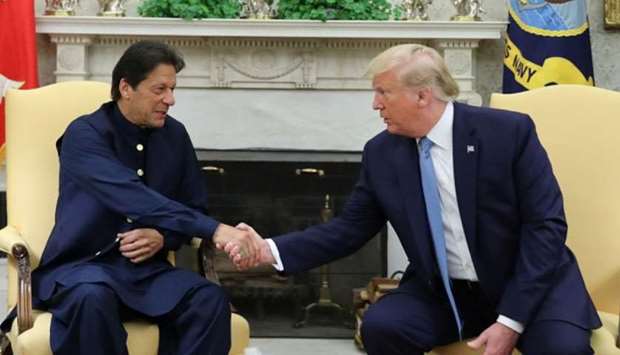Trump offers to mediate between India and Pakistan on Kashmir
Prime Minister Imran Khan met US President Donald Trump for talks on Monday at the White House, during which the latter offered to mediate between Pakistan and India on the issue of Kashmir.
The talks also focused on Afghanistan as the US seeks a peace accord with the Taliban.
Islamabad wants to shore up relations with Washington after years of discord following the discovery of the September 11, 2001 terror attacks architect Osama bin Laden on Pakistani soil, where he was killed in a US raid in 2011.
India, which in February came close to war with Pakistan over the disputed region of Kashmir and which accuses Islamabad of supporting militants, will be watching the talks closely.
Trump offered on Monday to mediate the decades-long Kashmir dispute, signalling a shift in long-standing US policy that the issue must be solved bilaterally.
Kashmir has been divided between India, Pakistan, and China since the end of British colonial rule in 1947, and remains at the root of tensions between the two nuclear-armed South Asian countries.
“If I can help, I would love to be a mediator,” Trump said. “If I can do anything to help, let me know.”
US mediation has long been sought by Pakistan.
India's foreign ministry denied on Monday that Trump had been asked by Indian Prime Minister Narendra Modi to mediate the Kashmir conflict with Pakistan.
"We have seen President Trump's remarks to the press that he is ready to mediate, if requested by India and Pakistan, on the Kashmir issue. No such request has been made by prime minister to the US president," said Raveesh Kumar, official spokesman of India's ministry of external affairs. "It has been India's consistent position that all outstanding issues with Pakistan are discussed only bilaterally."
In February, a suicide bombing claimed by a Pakistan-based militant group killed 41 Indian troops in Indian-administered Kashmir, prompting tit-for-tat air strikes between the two countries.
Some 70,000 people, mostly civilians, have been killed over the past 30 years in Indian-administered Kashmir, monitoring groups say.
The fighting is between Indian soldiers – who number around 500,000 on the ground – and rebels wanting either independence or union with Pakistan.
It is far from the first time that Trump has offered to intervene in a seemingly intractable international dispute.
On Friday, Trump said that he remained at the ready to assist South Korea and Japan resolve their lingering dispute over World War II-era forced labour that has blighted their trade relations.
In 2017, he offered to mediate territorial disputes in the South China Sea between China, Vietnam, and other Asia-Pacific countries – a proposal that did not move forward.
Meanwhile, the Pentagon said that Pakistan’s army chief, General Qamar Javed Bajwa, will meet with the top American military officer, chairman of the US Joint Chiefs of Staff General Joseph Dunford.
Analysts believe Bajwa will play a key role in behind-the-scenes discussions in which much of the serious business of the visit will take place, with the military looking to persuade Washington to restore aid and co-operation.
On the issue of Afghanistan, Trump said the US is working with Islamabad to find a way out of the war in Afghanistan.
“I don’t think Pakistan respected the United States” in the past, Trump said, but “they are helping us a lot now”.
He held out the possibility of restoring US aid to Pakistan, depending upon what is worked out.
Prime Minister Khan meanwhile told Trump that there is only one solution for Afghanistan, and that a peace deal with the Taliban is closer than it had ever been.
He said he hoped in the coming days to be able to urge the Taliban to continue the talks.
The goal of the prime minister’s first visit to the White House since taking power, said a senior Trump administration official earlier before the meeting, is “to press for concrete co-operation to advance the Afghanistan peace process”.
The US views Pakistan’s co-operation with a deal to end the 17-year-old war as essential.
The Trump administration also wants to encourage Pakistan to “deepen and sustain its recent effort to crack down on militants and terrorists within its territory”, the official said on condition of anonymity.
The US is pressing for a political agreement with the Taliban before presidential voting in Afghanistan in late September.
This would clear the way for most US troops to withdraw from Afghanistan and bring an end to America’s longest war.
Washington and Kabul accuse Pakistan of supporting armed extremist groups, such as the Haqqani network, which is an ally of the Taliban, by giving it refuge in Pakistani regions along the border with Afghanistan.
Pakistan denies providing such support and argues that, in fact, it has sustained huge losses in terms of lives and money as it fights extremism.
“We are concerned about the links between these groups and Pakistan’s intelligence services and military,” the administration official said, referring to the Jaish-e-Mohamed, the Lashkar-e-Taiba (LeT), and the Haqqani network.
Days before Khan’s visit, Pakistani authorities detained Hafiz Saeed, the founder of the LeT and the alleged mastermind of the 2008 Mumbai attacks, in a move hailed by Trump as a result of the pressure applied by his administration.

